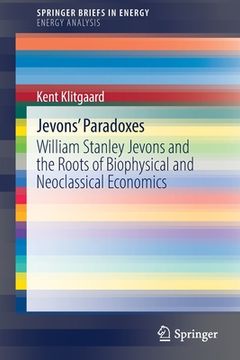Share
Jevons' Paradoxes: William Stanley Jevons and the Roots of Biophysical and Neoclassical Economics (in English)
Kent Klitgaard
(Author)
·
Springer
· Paperback
Jevons' Paradoxes: William Stanley Jevons and the Roots of Biophysical and Neoclassical Economics (in English) - Klitgaard, Kent
$ 47.36
$ 49.99
You save: $ 2.63
Choose the list to add your product or create one New List
✓ Product added successfully to the Wishlist.
Go to My WishlistsIt will be shipped from our warehouse between
Wednesday, June 12 and
Thursday, June 13.
You will receive it anywhere in United States between 1 and 3 business days after shipment.
Synopsis "Jevons' Paradoxes: William Stanley Jevons and the Roots of Biophysical and Neoclassical Economics (in English)"
In 1865, economist William Stanley Jevons published The Coal Question, describing the crucial role that coal played in British economic development. Here, he enunciated what has come to be known as the Jevons paradox, which stated that improvements in resource efficiency leads to greater resource use as the expansion of scale occasioned by lower operating costs overwhelms the savings due to greater efficiency. The implications for any sustainability scenario are enormous and a major theme of this book. While The Coal Question provided the theory that was a precursor to peak oil and resource limits to growth, it was followed six years later by the Theory of Political Economy, the first English-language work of neoclassical economics, which denies the importance of energy as a special commodity. In spite of this apparent contradiction, in this book biophysical economist Kent Klitgaard makes clear that there is no epistemological break between The Coal Question and Theory of Political Economy. Indeed, the Jevons paradox makes little sense in the absence of a behavioral theory grounded in marginal utility, which recognizes the satisfaction that each of us gains as consumers of one more unit of a good or service. Jevons could not solve this paradox in light of his belief that coal mines were becoming exhausted and more expensive to operate, and that there was no substitute for coal. However, he was uninterested in questions of sustainability; rather, he wanted to maintain British industrial and imperial dominance. Did the eventual substitution of oil for coal simply allow us to run through other resources at an accelerated rate? Indeed, the petroleum economy of the 20th and early 21st centuries has presented vastly expanded opportunities for the operation of the Jevons Paradox. This book shows the connections among the different paradoxes in Jevons' work, and exposes the potentially fatal flaws that confound technological solutions to the sustainability challenge.
- 0% (0)
- 0% (0)
- 0% (0)
- 0% (0)
- 0% (0)
All books in our catalog are Original.
The book is written in English.
The binding of this edition is Paperback.
✓ Producto agregado correctamente al carro, Ir a Pagar.

